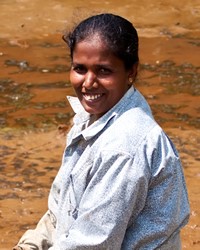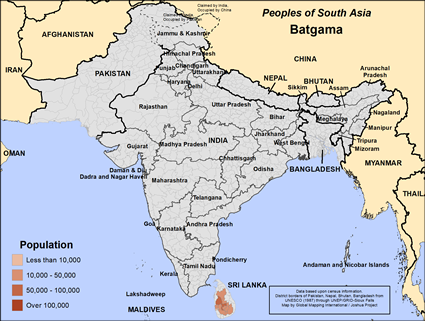Batgama in Sri Lanka

Photo Source:
Copyrighted © 2026
Sarii Iuliia - Shutterstock All rights reserved. Used with permission |

Map Source:
People Group data: Omid. Map geography: UNESCO / GMI. Map Design: Joshua Project
|
| People Name: | Batgama |
| Country: | Sri Lanka |
| 10/40 Window: | Yes |
| Population: | 409,000 |
| World Population: | 409,000 |
| Primary Language: | Sinhala |
| Primary Religion: | Buddhism |
| Christian Adherents: | 1.48 % |
| Evangelicals: | 0.00 % |
| Scripture: | Complete Bible |
| Ministry Resources: | Yes |
| Jesus Film: | Yes |
| Audio Recordings: | Yes |
| People Cluster: | South Asia Buddhist |
| Affinity Bloc: | South Asian Peoples |
| Progress Level: |
|
Introduction / History
Bathgama people derive their name from Bath/rice, and gama/village in the Sinhala language.
What Are Their Lives Like?
The primary language of Batgame people in Sri Lanka is Sinhala. Their primary occupation is farming, and their staple food is rice. The laws of Buddhism dictate their lives and values.
What Are Their Beliefs?
Batgama people in Sri Lanka practice Buddhism, the major world religion based on the teachings of Siddhartha Gautama or the Buddha, who lived in the 6th and 5th century BC in ancient India. He taught that by following the path of right intentions and right actions, a Buddhist can achieve nirvana or a state of freedom and salvation.
What Are Their Needs?
Although the Bible, audio and visual resources exist in Sinhala, the primary language of the Batgama people, they remain an unreached people group. Their most important need is to understand that Almighty God has provided a full payment for their sins, that they are infinitely loved, and that a place of peace and joy has been prepared for them if they will believe Him.
Prayer Points
Pray that Lord Jesus will send believers who understand their Sinhala language and the spiritual mindset of Batgama people. Pray that Batgama people would have the opportunity to place their faith in Jesus Christ and become brothers and sisters in Him. Pray that a Disciple Making Movement will begin among them that will transform their communities and families, bringing God's blessings.